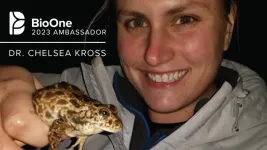(Press-News.org) Research Highlights:
Using ultrasound guidance, researchers successfully repaired a potentially deadly vascular malformation, called vein of Galen malformation, deep in the brain of a fetus before birth. The malformation, which has massively high blood flow, often leads to heart failure, severe brain injury or possibly death soon after birth.
The first in-utero embolization repair was successfully performed on a fetus at 34 weeks and 2 days gestational age. Fetal ultrasound showed an immediate drop in abnormal blood flow through the brain malformation, and fetal echocardiography showed significant improvement in heart function the day after the procedure.
Since birth, the infant has required no medication to treat heart failure and no postnatal surgery to treat the malformation. Repeated echocardiograms after birth displayed marked improvement in cardiac output, and brain MRIs showed no brain injury and a normal neurological exam.
Embargoed until 4 a.m. CT/5 a.m. ET Thursday May 4, 2023
DALLAS, May 4, 2023 — For the first time, researchers performed a successful in-utero surgery to repair a potentially deadly developmental condition by treating an aggressive vascular malformation, called vein of Galen malformation, in a fetus’s brain before birth, according to new research published today in Stroke, the peer-reviewed flagship journal of the American Stroke Association, a division of the American Heart Association.
Vein of Galen malformation (VOGM) is a rare prenatal condition in which arteries bringing high-flow, high-pressure blood to the brain from the heart connect directly with one of the main collecting veins deep at the base of the brain, rather than to capillaries that are necessary to slow blood flow and deliver oxygen to surrounding brain tissue. Due to changes in the infant’s vascular physiology during and after the birth process, the high flow in the malformation has an even more serious effect on the heart and brain after birth, putting enormous pressure on the newborn’s heart and lungs. This may lead to pulmonary hypertension, heart failure or other potentially life-threatening conditions. VOGM is most often first seen on a prenatal ultrasound and is definitively diagnosed by MRI during the late second or third trimester of pregnancy.
The researchers performed the in-utero embolization on a fetus with VOGM at 34 weeks and 2 days gestational age, as the first treated patient in a clinical trial that is underway at Boston Children’s Hospital and Brigham and Women’s Hospital, performed with oversight from the U.S. Food and Drug Administration.
“In our ongoing clinical trial, we are using ultrasound-guided transuterine embolization to address the vein of Galen malformation before birth, and in our first treated case, we were thrilled to see that the aggressive decline usually seen after birth simply did not appear. We are pleased to report that at six weeks, the infant is progressing remarkably well, on no medications, eating normally, gaining weight and is back home. There are no signs of any negative effects on the brain,” said lead study author Darren B. Orbach, M.D., Ph.D., co-director of the Cerebrovascular Surgery & Interventions Center at Boston Children’s Hospital and an associate professor of radiology at Harvard Medical School.
Due to premature rupture of membranes during the in-utero embolization, the infant was delivered by induction of vaginal birth two days later. Echocardiography after birth showed progressive normalization of cardiac output. In this case, the newborn did not require any cardiovascular support or surgery following the in-utero treatment and was watched in the NICU for several weeks after birth because of prematurity before being sent home. During that time, the newborn had a normal neurological exam and showed no strokes, fluid buildup or hemorrhage on brain MRI.
“While this is only our first treated patient and it is vital that we continue the trial to assess the safety and efficacy in other patients, this approach has the potential to mark a paradigm shift in managing vein of Galen malformation where we repair the malformation prior to birth and head off the heart failure before it occurs, rather than trying to reverse it after birth,” Orbach said. “This may markedly reduce the risk of long-term brain damage, disability or death among these infants.”
It is estimated that VOGM, the most common congenital vascular brain malformation, occurs in as many as one in every 60,000 births. The current standard of care for VOGM is treatment after birth with embolization, a catheter-based procedure to close off the direct artery-to-vein connections in the malformation and block the excess blood flow to the brain and heart. However, embolization itself is high risk and is not always successful at reversing heart failure. Additionally, severe brain damage may have already occurred, which may lead to life-long cognitive disabilities and life-threatening conditions for the infant, or even to death.
“The fetal intervention team at Boston Children’s Hospital and Brigham and Women’s Hospital have successfully devised another in utero procedure that may be very impactful in a specific group of patients diagnosed with vein of Galen malformation,” said Gary M. Satou, M.D., FAHA, the director of pediatric echocardiography at UCLA Mattel Children's Hospital and co-director of the UCLA Fetal Cardiology Program and who was not involved with the study. Satou, a pediatric cardiologist, is past chair of the American Heart Association’s Congenital Cardiac Defects committee of Young Hearts Council and a clinical professor in the department of pediatrics at the David Geffen School of Medicine at UCLA.
“As always, a number of these fetal cases will need to be performed and followed in order to establish a clear pattern of improvement in both neurologic and cardiovascular outcomes,” Satou said. “Thus, the national clinical trial will be crucial in order to achieve adequate data and, hopefully, successful outcomes.”
The procedure was not without its limitations, noted Colin P. Derdeyn, M.D., a neurointerventional radiologist at University of Iowa Health Care who performs VOGM embolizations on neonates and who was not involved with the study.
“The key advance here is to intervene before the physiologic events of birth can cause life-threatening heart failure. There are caveats; one successful case is not enough experience for us to conclude that the risks of this procedure are worth the benefits. Safety issues may crop up in future procedures, and this approach through the veins may not be consistently successful in preventing heart failure. The procedure described here is designed to reduce the flow through the malformation and not to cure it,” said Derdeyn, the Krabbenhoft Professor of Radiology and chair and department executive officer of the department of radiology at the University of Iowa Health Care Carver College of Medicine and a past chair of the American Heart Association’s Stroke Council.
“However, the positive hemodynamic changes that they observed in utero and after birth – reduction in flow, reduction in size of the draining vein, reversal of the abnormal reversed flow in the aorta - are really encouraging. These are some of the most exciting and surprising aspects of this case report,” he said. “This is pioneering work being done in a very careful and responsible way.”
Co-authors are Louise E. Wilkins-Haug, M.D.; Carol B. Benson, M.D.; Wayne Tworetzky, M.B. Ch.B.; Shivani D. Rangwala, M.D.; Stephanie H. Guseh, M.D.; Nicole K. Gately, R.N.; Jeffrey N. Stout, Ph.D.; Arielle Mizrahi-Arnaud, M.D.; and Alfred P. See, M.D. Authors’ disclosures are listed in the manuscript.
The study was funded by a grant from the Sage Schermerhorn Chair for Image-Guided Therapy (DBO) in Boston Children’s Hospital’s Radiology Department.
Statements and conclusions of studies published in the American Heart Association’s scientific journals are solely those of the study authors and do not necessarily reflect the Association’s policy or position. The Association makes no representation or guarantee as to their accuracy or reliability. The Association receives funding primarily from individuals; foundations and corporations (including pharmaceutical, device manufacturers and other companies) also make donations and fund specific Association programs and events. The Association has strict policies to prevent these relationships from influencing the science content. Revenues from pharmaceutical and biotech companies, device manufacturers and health insurance providers and the Association’s overall financial information are available here.
Additional Resources:
Multimedia is available on right column of release link https://newsroom.heart.org/news/in-first-in-utero-brain-surgery-doctors-eliminated-symptoms-of-dangerous-condition?preview=fd7375c004320bb556734c55868c91ed
After May 4, view the manuscript online
AHA resources: Stroke Month 2023
Follow AHA/ASA news on Twitter @HeartNews
Follow news from the Stroke journal @StrokeAHA_ASA
About the American Heart Association
The American Heart Association is a relentless force for a world of longer, healthier lives. We are dedicated to ensuring equitable health in all communities. Through collaboration with numerous organizations, and powered by millions of volunteers, we fund innovative research, advocate for the public's health and share lifesaving resources. The Dallas-based organization has been a leading source of health information for nearly a century. Connect with us on heart.org, Facebook, Twitter or by calling 1-800-AHA-USA1.
###
END
In first in-utero brain surgery, doctors eliminated symptoms of dangerous condition
Researchers report on the first-of-its-kind fetal procedure to fix a potentially deadly vascular malformation in the brain, avoiding heart failure and brain injury after birth, published in the journal Stroke
2023-05-04
ELSE PRESS RELEASES FROM THIS DATE:
Team performs first-of-its-kind, in-utero procedure to fix deadly vascular malformation
2023-05-04
In a first, a team from Brigham and Women’s Hospital and Boston Children’s Hospital successfully treated an aggressive vascular malformation in an infant’s brain before birth, avoiding potentially fatal symptoms after delivery.
Collaborating researchers and clinicians from Boston Children’s Hospital and Brigham and Women’s Hospital have prevented a deadly developmental condition by treating an aggressive vascular malformation in an infant’s brain before birth. The case, which is the first-ever, in-utero cerebrovascular surgery in the United States, ...
Indigenous people in South America are twice as likely to die from wildfires
2023-05-04
A new study, published in IOP Publishing’s journal Environmental Research: Health, reveals that Indigenous people in the Amazon Basin are twice as likely to die prematurely from smoke exposure due to wildfires than the broader South American population. Regions in Peru, Bolivia and Brazil are identified as particular hotspots for smoke exposure, with mortality rates rising to as high as 6 times that of the general population.
The results show that smoke from wildfires in South America account for approximately 12,000 premature deaths every year from 2014 to 2019, with ...
Restricting flavored e-cigarettes may reduce their use among teens and young adults: Study
2023-05-04
PISCATAWAY, NJ—Getting many adolescents and young adults to stop using e-cigarettes may be as simple as doing away with flavored versions of the product, according to new research in the Journal of Studies on Alcohol and Drugs. This study suggests that a large majority of current users may discontinue their use if the product became available in the tobacco version only.
“The restriction of the availability for certain e-cigarette e-liquid flavors has been considered by various regulatory ...
Alumna named BioOne Ambassador for doctoral work in biological sciences
2023-05-04
Chelsea Kross, a University of Arkansas alumna in biological sciences, earned a 2023 BioOne Ambassador award for her submission “Not all frogs can make it in the city: Using the landscape for targeted conservation,” which summarized research done while working toward her Ph.D.
The award recognizes early career researchers in biological, ecological and environmental sciences who demonstrate creative approaches to science communication.
“Communicating complex research is critically important to fostering public understanding and support for the sciences,” said Lauren Kane, president and CEO of BioOne. “The 2023 BioOne ...
Remote aerobic walking exercise training feasible for improving cognitive processing speed in persons with multiple sclerosis
2023-05-04
East Hanover, NJ. May 3, 2023 – Results of a pilot study funded by Kessler Foundation showed that remote aerobic walking exercise training is a feasible and highly promising method for improving cognitive processing speed impairment in fully ambulatory persons with multiple sclerosis (MS). The findings of this single-blind randomized control trial support the design of a randomized, controlled trial in large sample of persons with MS
The study, titled "Feasibility of Remotely Delivered and Supported Aerobic Walking Exercise Training for Cognitive Processing Speed Impairment in Fully Ambulatory Persons with Multiple Sclerosis," (doi: ...
Offering genetic testing at the point of care may increase uptake
2023-05-04
Genetic testing for hereditary cancers, such as breast, colon, pancreatic, and ovarian cancer, helps at-risk individuals understand their familial risk for these diseases and make informed decisions about next steps in care. But fewer than 20 percent of at-risk patients utilize this testing, and even fewer engage in genetic counseling after referral, often due to clinical workflow challenges or barriers to care.
Amid national efforts to increase access to genetic testing, a new study led by a Boston University School of Public Health researcher has identified a streamlined approach in clinical settings that may help advance ...
Early life abuse may be linked to greater risk of adult premature death
2023-05-04
Physical and sexual abuse in childhood and adolescence could be associated with a greater risk of adult premature death (before age 70), finds research published by The BMJ today.
This study extends and refines the existing evidence in this area, and highlights the importance of providing trauma informed care for those who have experienced child abuse, say the researchers.
Early life abuse is a global public health issue because it substantially contributes to child death and a range of long term consequences during adulthood. However, the association of childhood or adolescent abuse with total and cause specific premature death during adulthood ...
New study finds no increased risk of menstrual changes after COVID-19 vaccination
2023-05-04
A Swedish study of nearly 3 million women published by The BMJ today finds no evidence of an increased risk of menstrual changes after covid-19 vaccination.
Weak and inconsistent associations were found between covid-19 vaccination and contact with healthcare for postmenopausal bleeding and were even less consistent for menstrual disturbance and premenstrual bleeding.
These findings do not provide any substantial support for a causal association between covid-19 vaccination and diagnoses related to ...
TSIM introduces online training course for successfully implementing sustainable telehealth services
2023-05-04
The Telehealth Service Implementation Model (TSIM) is set to launch a brand-new online training course for telehealth leaders and teams. TSIM originated at the Medical University of South Carolina (MUSC), stemming from the successful and groundbreaking work of its successful telehealth team. The MUSC Health Center for Telehealth is one of only two federally designated National Telehealth Centers of Excellence in the country.
All-encompassing in nature, TSIM’s structured framework facilitates the development, implementation and optimization of telehealth services. The pioneers of this unique model aimed to share their knowledge and telehealth best practices with other ...
Durham University receives £9m Wellcome award to transform humanities’ contribution to health research
2023-05-04
-With pictures-
Durham University researchers have been awarded the largest grant ever made by the Wellcome Trust for humanities research.
The £9 million award was announced today (4 May 2023) and will fund a new Discovery Research Platform for Medical Humanities (DRP-MH).
The Discovery Research Platform for Medical Humanities will bring the stories and perspectives of people with lived experience of complex health conditions to the forefront of health research.
The Platform will involve people with lived experience and people from marginalised communities as ...
LAST 30 PRESS RELEASES:
Trapping light on thermal photodetectors shatters speed records
New review highlights the future of tubular solid oxide fuel cells for clean energy systems
Pig farm ammonia pollution may indirectly accelerate climate warming, new study finds
Modified biochar helps compost retain nitrogen and build richer soil organic matter
First gene regulation clinical trials for epilepsy show promising results
Life-changing drug identified for children with rare epilepsy
Husker researchers collaborate to explore fear of spiders
Mayo Clinic researchers discover hidden brain map that may improve epilepsy care
NYCST announces Round 2 Awards for space technology projects
How the Dobbs decision and abortion restrictions changed where medical students apply to residency programs
Microwave frying can help lower oil content for healthier French fries
In MS, wearable sensors may help identify people at risk of worsening disability
Study: Football associated with nearly one in five brain injuries in youth sports
Machine-learning immune-system analysis study may hold clues to personalized medicine
A promising potential therapeutic strategy for Rett syndrome
How time changes impact public sentiment in the U.S.
Analysis of charred food in pot reveals that prehistoric Europeans had surprisingly complex cuisines
As a whole, LGB+ workers in the NHS do not experience pay gaps compared to their heterosexual colleagues
How cocaine rewires the brain to drive relapse
Mosquito monitoring through sound - implications for AI species recognition
UCLA researchers engineer CAR-T cells to target hard-to-treat solid tumors
New study reveals asynchronous land–ocean responses to ancient ocean anoxia
Ctenophore research points to earlier origins of brain-like structures
Tibet ASγ experiment sheds new light on cosmic rays acceleration and propagation in Milky Way
AI-based liquid biopsy may detect liver fibrosis, cirrhosis and chronic disease signals
Hope for Rett syndrome: New research may unlock treatment pathway for rare disorder with no cure
How some skills become second nature
SFU study sheds light on clotting risks for female astronauts
UC Irvine chemists shed light on how age-related cataracts may begin
Machine learning reveals Raman signatures of liquid-like ion conduction in solid electrolytes
[Press-News.org] In first in-utero brain surgery, doctors eliminated symptoms of dangerous conditionResearchers report on the first-of-its-kind fetal procedure to fix a potentially deadly vascular malformation in the brain, avoiding heart failure and brain injury after birth, published in the journal Stroke




